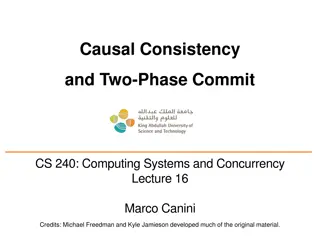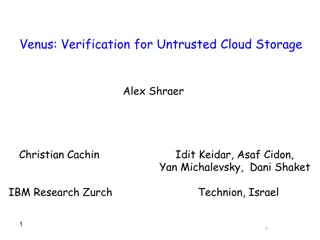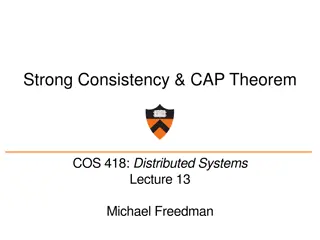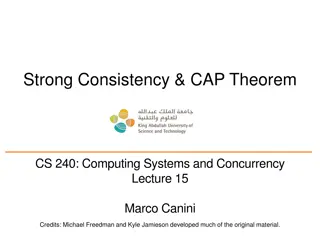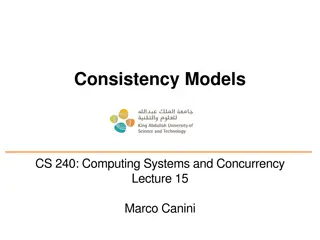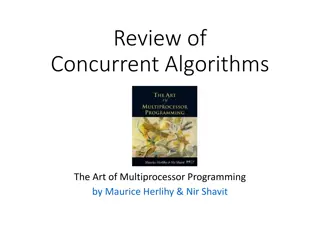Causal Consistency in Distributed Systems
This content covers the concept of causal consistency in computing systems, exploring consistency models such as Causal Linearizability and Eventual Sequential. It explains the importance of logical clocks like Lamport and vector clocks, and how they ensure order in distributed systems. The concept
1 views • 35 slides
Ensuring Integrity and Consistency in Remote Storage Systems
Venus project aims to address trust issues in cloud storage by guaranteeing integrity and consistency to users even in the presence of faults. It explores strong consistency requirements, challenges in achieving it, and proposes solutions like fork linearizability to handle faulty servers effectivel
2 views • 18 slides
Strong Consistency and CAP Theorem in Distributed Systems
Strong consistency and the CAP theorem play a crucial role in the design and implementation of distributed systems. This content explores different consistency models such as 2PC, consensus, eventual consistency, Paxos, and Raft, highlighting the importance of maintaining ordering and fault-toleranc
3 views • 29 slides
Strong Consistency & CAP Theorem in Computing Systems
Explore the concepts of strong consistency, CAP theorem, network partitions, linearizability, and how systems handle partitions. Delve into the trade-offs between consistency, availability, and partition-tolerance as outlined by the CAP theorem.
12 views • 42 slides
Consistency Models in Distributed Systems
Consistency models in distributed systems define guarantees about how operations are executed across replicas. Linearizability, a key model, ensures that all replicas execute operations in a total order based on real-time ordering. This principle eliminates stale reads and enforces wall-clock orderi
3 views • 36 slides
Compositional Verification of Termination-Preserving Refinement in Concurrent Programs
This research explores the compositional verification of termination-preserving refinement in concurrent programs, focusing on correctness, optimizations, and the application of new simulation as meta-theory. Contributions include a rely-guarantee-based program logic and the verification of lineariz
1 views • 34 slides
Gryff: Unifying Consensus and Shared Registers
This presentation delves into the integration of consensus and shared registers for fault tolerance and linearizability, highlighting the importance of strong synchronization and low read tail latency. It explores various systems and interfaces such as Cloud Spanner, SMR, and shared registers, discu
2 views • 29 slides
Data Consistency in Distributed Systems
Learn about strong vs. weak consistency, CAP theorem, linearizability, broken protocols, non-linearizable history, and fixed protocols in distributed systems to grasp the importance of data consistency for system reliability and performance.
0 views • 17 slides
Strong Consistency and CAP Theorem in Distributed Systems
Explore strong consistency, CAP theorem, consensus models like Paxos and Raft, fault-tolerance, and linearizability in distributed systems. Learn about ensuring ordering between operations, the behavior of a single copy of an object, and the importance of the happens-before relationship. Discover st
3 views • 29 slides
Concurrent Algorithms: A Review of Multiprocessor Programming Concepts
Delve into the world of concurrent algorithms with this comprehensive review of Maurice Herlihy and Nir Shavit's "Concurrent Algorithms: The Art of Multiprocessor Programming". Explore topics like concurrent computation, memory object management, and correctness in concurrent objects, along with a q
3 views • 27 slides
Concurrent Program Refinement and Verification Overview
Explore the world of refining and verifying concurrent programs and their applications, covering topics such as refinement techniques, compilers, linearizability, and more.
0 views • 51 slides
Consistency Models in Distributed Systems
Explore the concepts of consistency, strict serializability, linearizability, and their examples in distributed systems. Learn about total ordering, real-time ordering, and the pros and cons of different consistency models.
1 views • 25 slides
Understanding Consensus in Advanced Computer Systems
Dive into the world of advanced computer systems with a focus on consensus protocols like linearizability, two-phase commit, and Paxos. Explore concepts such as strong consistency, two-phase commit protocol, and the role of consensus in maintaining system integrity and resource access. Learn about t
1 views • 47 slides
